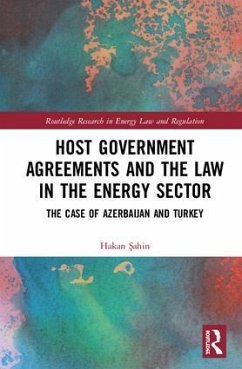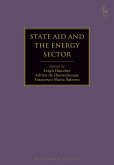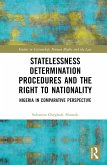Hakan Sahin
Host Government Agreements and the Law in the Energy Sector
The Case of Azerbaijan and Turkey
Hakan Sahin
Host Government Agreements and the Law in the Energy Sector
The Case of Azerbaijan and Turkey
- Gebundenes Buch
- Merkliste
- Auf die Merkliste
- Bewerten Bewerten
- Teilen
- Produkt teilen
- Produkterinnerung
- Produkterinnerung
This book which determines the political risks that arise from unilateral actions of host governments during the life span of the energy investment projects. Focusing on stabilisation clauses as a political risk manager, it examines what influences host states to agree stability in their long term host governmental agreements.
Andere Kunden interessierten sich auch für
![The Mekong: A Socio-Legal Approach to River Basin Development The Mekong: A Socio-Legal Approach to River Basin Development]() Ben BoerThe Mekong: A Socio-Legal Approach to River Basin Development197,99 €
Ben BoerThe Mekong: A Socio-Legal Approach to River Basin Development197,99 €![Public and Private in Natural Resource Governance Public and Private in Natural Resource Governance]() Public and Private in Natural Resource Governance127,99 €
Public and Private in Natural Resource Governance127,99 €![State Aid and the Energy Sector State Aid and the Energy Sector]() State Aid and the Energy Sector273,99 €
State Aid and the Energy Sector273,99 €![Resolving Environmental Conflicts Resolving Environmental Conflicts]() Chris MaserResolving Environmental Conflicts155,99 €
Chris MaserResolving Environmental Conflicts155,99 €![Brexit and Procurement Law Brexit and Procurement Law]() Catherine MaddoxBrexit and Procurement Law79,99 €
Catherine MaddoxBrexit and Procurement Law79,99 €![Statelessness Determination Procedures and the Right to Nationality Statelessness Determination Procedures and the Right to Nationality]() Solomon Oseghale MomohStatelessness Determination Procedures and the Right to Nationality174,99 €
Solomon Oseghale MomohStatelessness Determination Procedures and the Right to Nationality174,99 €![Collaborative Environmental Governance Frameworks Collaborative Environmental Governance Frameworks]() Timothy GiesekeCollaborative Environmental Governance Frameworks186,99 €
Timothy GiesekeCollaborative Environmental Governance Frameworks186,99 €-
-
-
This book which determines the political risks that arise from unilateral actions of host governments during the life span of the energy investment projects. Focusing on stabilisation clauses as a political risk manager, it examines what influences host states to agree stability in their long term host governmental agreements.
Hinweis: Dieser Artikel kann nur an eine deutsche Lieferadresse ausgeliefert werden.
Hinweis: Dieser Artikel kann nur an eine deutsche Lieferadresse ausgeliefert werden.
Produktdetails
- Produktdetails
- Verlag: Taylor & Francis
- Seitenzahl: 208
- Erscheinungstermin: 7. Dezember 2018
- Englisch
- Abmessung: 234mm x 156mm x 13mm
- Gewicht: 472g
- ISBN-13: 9781138591332
- ISBN-10: 1138591335
- Artikelnr.: 54801322
- Herstellerkennzeichnung
- Libri GmbH
- Europaallee 1
- 36244 Bad Hersfeld
- gpsr@libri.de
- Verlag: Taylor & Francis
- Seitenzahl: 208
- Erscheinungstermin: 7. Dezember 2018
- Englisch
- Abmessung: 234mm x 156mm x 13mm
- Gewicht: 472g
- ISBN-13: 9781138591332
- ISBN-10: 1138591335
- Artikelnr.: 54801322
- Herstellerkennzeichnung
- Libri GmbH
- Europaallee 1
- 36244 Bad Hersfeld
- gpsr@libri.de
Hakan Sahin is an Assistant Professor in Private International Law at Maltepe University, Istanbul. He regularly advises state entities as well as private clients on a range of issues, including international energy law, international arbitration and international investment law.
Acknowledgements
List of abbreviations
PART I
Political risks in the energy sector
1 Introduction and framework of the research
Introduction
Expropriation or nationalisation?
Why are stabilisation clauses a controversial issue?
Host government agreements
Objectives and scope of the research
The gap in conventional literature
Research questions
Methodology
Overview of Azerbaijan and Turkey
Baku-Tbilisi-Ceyhan crude oil pipeline project: timeline, importance and
issues
Structure of the book
2 Indirect expropriation
Introduction
Distinguishing between direct and indirect expropriation
The types of host state measures that may constitute indirect expropriation
Criteria for the distinction between legitimate regulation (noncompensable
regulation) and indirect expropriation
Sole effect versus police power
Bilateral investment treaties of Azerbaijan and Turkey and their treaty
provisions concerning indirect expropriation
Tools for mitigating indirect expropriation risk
Conclusions
PART II
Mitigating political risks through stability provisions
3 Stabilisation clauses
Introduction
General implications of stabilisation clauses
Typologies of stabilisation clauses
Legal importance and functional value of stabilisation clauses
Do stabilisation provisions constitute a threat to environmental protection
and human rights?
The BTC pipeline project (I): reactions to the project
Conclusion
4 Lenders, risk insurers and rating agencies
Introduction
The main financial institutions in project financing
The role of lenders in inclusion of stabilisation clauses
Political risk insurance providers
The role of political risk insurance providers in the inclusion of
stabilisation clauses
Credit rating agencies
The role of credit rating providers in the inclusion of stabilisation
clauses
Baku-Tbilisi-Ceyhan pipeline project (II)
Conclusions
5 Political systems and laws on foreign investment in Azerbaijan and Turkey
Introduction
Azerbaijan
Turkey
A comparison of guarantees available under FDI laws and political regimes
in Azerbaijan and Turkey
Conclusions
PART III
Conclusion and recommendations
6 Conclusions and recommendations
The research findings and conclusions
Recommendations
Index
List of abbreviations
PART I
Political risks in the energy sector
1 Introduction and framework of the research
Introduction
Expropriation or nationalisation?
Why are stabilisation clauses a controversial issue?
Host government agreements
Objectives and scope of the research
The gap in conventional literature
Research questions
Methodology
Overview of Azerbaijan and Turkey
Baku-Tbilisi-Ceyhan crude oil pipeline project: timeline, importance and
issues
Structure of the book
2 Indirect expropriation
Introduction
Distinguishing between direct and indirect expropriation
The types of host state measures that may constitute indirect expropriation
Criteria for the distinction between legitimate regulation (noncompensable
regulation) and indirect expropriation
Sole effect versus police power
Bilateral investment treaties of Azerbaijan and Turkey and their treaty
provisions concerning indirect expropriation
Tools for mitigating indirect expropriation risk
Conclusions
PART II
Mitigating political risks through stability provisions
3 Stabilisation clauses
Introduction
General implications of stabilisation clauses
Typologies of stabilisation clauses
Legal importance and functional value of stabilisation clauses
Do stabilisation provisions constitute a threat to environmental protection
and human rights?
The BTC pipeline project (I): reactions to the project
Conclusion
4 Lenders, risk insurers and rating agencies
Introduction
The main financial institutions in project financing
The role of lenders in inclusion of stabilisation clauses
Political risk insurance providers
The role of political risk insurance providers in the inclusion of
stabilisation clauses
Credit rating agencies
The role of credit rating providers in the inclusion of stabilisation
clauses
Baku-Tbilisi-Ceyhan pipeline project (II)
Conclusions
5 Political systems and laws on foreign investment in Azerbaijan and Turkey
Introduction
Azerbaijan
Turkey
A comparison of guarantees available under FDI laws and political regimes
in Azerbaijan and Turkey
Conclusions
PART III
Conclusion and recommendations
6 Conclusions and recommendations
The research findings and conclusions
Recommendations
Index
Acknowledgements
List of abbreviations
PART I
Political risks in the energy sector
1 Introduction and framework of the research
Introduction
Expropriation or nationalisation?
Why are stabilisation clauses a controversial issue?
Host government agreements
Objectives and scope of the research
The gap in conventional literature
Research questions
Methodology
Overview of Azerbaijan and Turkey
Baku-Tbilisi-Ceyhan crude oil pipeline project: timeline, importance and
issues
Structure of the book
2 Indirect expropriation
Introduction
Distinguishing between direct and indirect expropriation
The types of host state measures that may constitute indirect expropriation
Criteria for the distinction between legitimate regulation (noncompensable
regulation) and indirect expropriation
Sole effect versus police power
Bilateral investment treaties of Azerbaijan and Turkey and their treaty
provisions concerning indirect expropriation
Tools for mitigating indirect expropriation risk
Conclusions
PART II
Mitigating political risks through stability provisions
3 Stabilisation clauses
Introduction
General implications of stabilisation clauses
Typologies of stabilisation clauses
Legal importance and functional value of stabilisation clauses
Do stabilisation provisions constitute a threat to environmental protection
and human rights?
The BTC pipeline project (I): reactions to the project
Conclusion
4 Lenders, risk insurers and rating agencies
Introduction
The main financial institutions in project financing
The role of lenders in inclusion of stabilisation clauses
Political risk insurance providers
The role of political risk insurance providers in the inclusion of
stabilisation clauses
Credit rating agencies
The role of credit rating providers in the inclusion of stabilisation
clauses
Baku-Tbilisi-Ceyhan pipeline project (II)
Conclusions
5 Political systems and laws on foreign investment in Azerbaijan and Turkey
Introduction
Azerbaijan
Turkey
A comparison of guarantees available under FDI laws and political regimes
in Azerbaijan and Turkey
Conclusions
PART III
Conclusion and recommendations
6 Conclusions and recommendations
The research findings and conclusions
Recommendations
Index
List of abbreviations
PART I
Political risks in the energy sector
1 Introduction and framework of the research
Introduction
Expropriation or nationalisation?
Why are stabilisation clauses a controversial issue?
Host government agreements
Objectives and scope of the research
The gap in conventional literature
Research questions
Methodology
Overview of Azerbaijan and Turkey
Baku-Tbilisi-Ceyhan crude oil pipeline project: timeline, importance and
issues
Structure of the book
2 Indirect expropriation
Introduction
Distinguishing between direct and indirect expropriation
The types of host state measures that may constitute indirect expropriation
Criteria for the distinction between legitimate regulation (noncompensable
regulation) and indirect expropriation
Sole effect versus police power
Bilateral investment treaties of Azerbaijan and Turkey and their treaty
provisions concerning indirect expropriation
Tools for mitigating indirect expropriation risk
Conclusions
PART II
Mitigating political risks through stability provisions
3 Stabilisation clauses
Introduction
General implications of stabilisation clauses
Typologies of stabilisation clauses
Legal importance and functional value of stabilisation clauses
Do stabilisation provisions constitute a threat to environmental protection
and human rights?
The BTC pipeline project (I): reactions to the project
Conclusion
4 Lenders, risk insurers and rating agencies
Introduction
The main financial institutions in project financing
The role of lenders in inclusion of stabilisation clauses
Political risk insurance providers
The role of political risk insurance providers in the inclusion of
stabilisation clauses
Credit rating agencies
The role of credit rating providers in the inclusion of stabilisation
clauses
Baku-Tbilisi-Ceyhan pipeline project (II)
Conclusions
5 Political systems and laws on foreign investment in Azerbaijan and Turkey
Introduction
Azerbaijan
Turkey
A comparison of guarantees available under FDI laws and political regimes
in Azerbaijan and Turkey
Conclusions
PART III
Conclusion and recommendations
6 Conclusions and recommendations
The research findings and conclusions
Recommendations
Index








